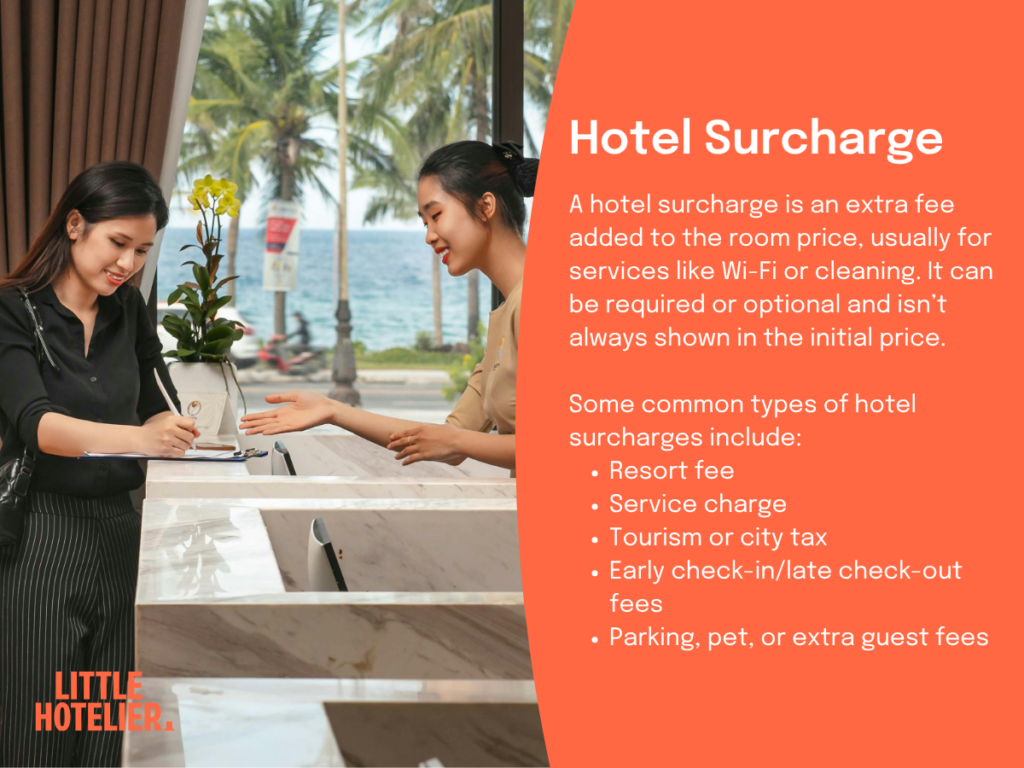A hotel surcharge is a fee paid by guests to cover additional services or costs not included in the base room rate. Examples of hotel surcharges include resort fees, minibar restocking fees, parking fees and charges for extra pool towels.
Hotel surcharges are distinct from guest purchases of on-site goods and services, such as drinks at the bar, meals at the restaurant, massages at the day spa and souvenirs at the front desk.
Unlike optional on-site purchases, surcharges are typically mandatory and not tied to guest choice, meaning hotel surcharges are designed to cover additional services or operational costs. They tend to be applied at checkout, although some mandatory surcharges, like resort fees, may be paid at the time of booking.
In this guide we’ll take a closer look at hotel surcharges, to understand what ‘surcharge’ might mean in your hotel, how to apply them, and how to best communicate these extra costs to guests.
Simplify surcharges and make more money with Little Hotelier
An all-in-one platform built for small properties, Little Hotelier offers a convenient way for your guests to book and pay.
Learn moreWhy do hoteliers apply surcharges?
Hoteliers apply surcharges to offset certain operating costs, and to monetise certain amenities or services. These fees can increase revenue and profitability without raising the room rate: the headline price that has an influence on booking decisions.
Surcharges allow hotels to remain competitive by advertising lower nightly rates while still recovering the full cost of a guest’s stay. They may be used to cover amenities like Wi-Fi, pool access or parking, or to pass on external costs such as taxes or energy charges.
Surcharges also help hotels offer flexible pricing models, tailoring costs based on actual service usage or guest behaviour. But they need to be used with discretion, as serving up what the guest perceives as a surprise fee or a hidden charge can have a very negative effect on your hotel’s reputation.
Key takeaways:
- Surcharges recover variable and external costs
- The help you maintain competitive and flexible pricing
- They must be used carefully and transparently
What types of surcharges are commonly applied in hotels?
Common hotel surcharges include resort fees, parking charges, minibar restocking, and early check-in/late check-out fees. These fees cover amenities or operational costs not included in the base room rate.
Resort fees are among the most widespread, covering access to pools, fitness centres, WiFi and other on-site facilities, and are charged regardless of whether the guest uses those amenities. As of 2025, the average resort fee charged by US hotels was around $35 per night, making up an average of 8.1% of the total nightly cost.
Other frequent surcharges include housekeeping, energy fees and room service delivery fees (separate from the food cost).
Key takeaways:
- On average resort fees alone can add almost 10% to the base rate
- Resort, parking and service fees are common surcharges
- Some fees apply regardless of usage

How do you set up a hotel surcharge policy?
Why is a clear hotel surcharge policy essential?
- Transparent surcharges can increase hotel profitability by up to 90%.
- 55% of guests prefer fees clearly separated from room rates.
- Clear policies ensure legal compliance and reduce negative reviews.
Establishing surcharges for your small, independent hotel is a delicate business. They’re an effective tool for maintaining profitability, but if they aren’t properly implemented they can also get guests off-side. Here’s how to set up your policy effectively.
1. Identify areas of additional costs
Start by pinpointing services or amenities that generate ongoing or variable expenses – parking, Wi-Fi, energy use, local taxes – and that aren’t covered by your standard room rate.
2. Decide how they are charged
Choose whether surcharges will be fixed (e.g. a nightly resort fee) or usage-based (e.g. per towel request), and determine if they’re optional or mandatory.
3. Add to your policy
Document the surcharges in your internal pricing policy, ensure your staff understand them, and consistently apply them across all relevant bookings.
4. Clearly display your surcharge policy
Disclose all surcharges upfront on your website and OTA listings, and include them in booking confirmations, to ensure every guest is fully aware of the total price.
5. Stay compliant with local regulations
Check consumer protection laws and hospitality regulations in your region, as some jurisdictions may prohibit certain fees, or may require you to disclose them in a certain way.
Key takeaways:
- Only charge for legitimate and justifiable costs
- Set up processes and train your staff on consistently applying fees
- Ensure all surcharges are clearly stated during the booking process
How to communicate surcharges to guests?
Clear communication with guests is essential for hotel surcharges. Transparency builds trust, reduces opportunities for negative feedback, and creates a smoother checkout experience.
Guests unsurprisingly appreciate honesty, and in good news, hotels are delivering. A recent survey reported that 83% of guests were satisfied with the transparency of room charges and other fees. But this satisfaction is only possible when surcharges are explained early, clearly and consistently across booking platforms, confirmation emails and in-person interactions. For example:
- At booking: “Our $20/night resort fee (applied at checkout) lets you enjoy Wi-Fi, parking and pool access.”
- On signage or welcome materials: “Keen for a sleep-in? Enjoy a 2pm check-out for just $30! Notify reception before 10am.”
A platform like Little Hotelier can help your property deliver total surcharge clarity and apply fees consistently, ensuring every guest is aware of every fee, to reduce issues and disputes.
Key takeaways:
- Communicate surcharges early and often
- Most guests are satisfied when charges are clearly explained
- Automation tools help small hotels better manage surcharges
FAQs on hotel surcharge
When is a surcharge considered unfair or deceptive?
A surcharge is considered unfair or deceptive when it is not clearly disclosed before booking, or comes as a surprise at checkout. Hidden fees that misrepresent the true cost of a stay don’t just hurt your reputation – they can also put you in regulatory crosshairs.
What are the risks of not managing hotel surcharges properly?
Without well-established surcharge processes and tools, you can anger guests, hurt your reputation and potentially break the law. Ultimately, you can put your hotel business in danger through lost bookings, fines and other penalties.
How to avoid hotel incidental charges?
For guests, avoiding incidental charges is about carefully reviewing a hotel’s surcharge policy prior to booking and asking for clarification at check-in. Hotels should also avoid surprise charges by clearly stating what is and isn’t included in the base rate.
By Dean Elphick
Dean is the Senior Content Marketing Specialist of Little Hotelier, the all-in-one software solution purpose-built to make the lives of small accommodation providers easier. Dean has made writing and creating content his passion for the entirety of his professional life, which includes more than six years at Little Hotelier. Through content, Dean aims to provide education, inspiration, assistance, and, ultimately, value for small accommodation businesses looking to improve the way they run their operations (and live their life).
Table of contents
“We’ve seen a 10-15% revenue increase with Little Hotelier. We had great support and met expectations during training. It’s very easy to manage via mobile app.”
Manager, Kränzel 21









Meg Hollins,
Marketing & Events Manager
Holbrook Hotel